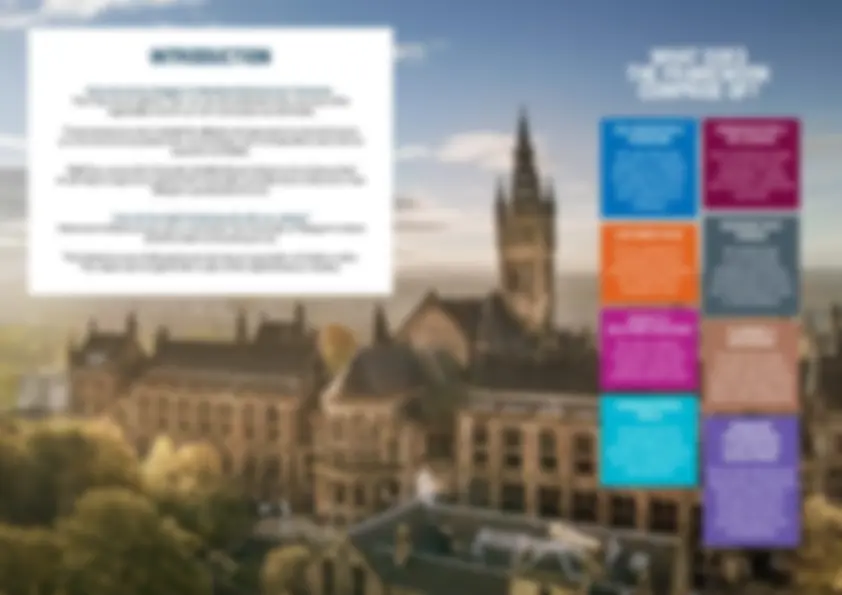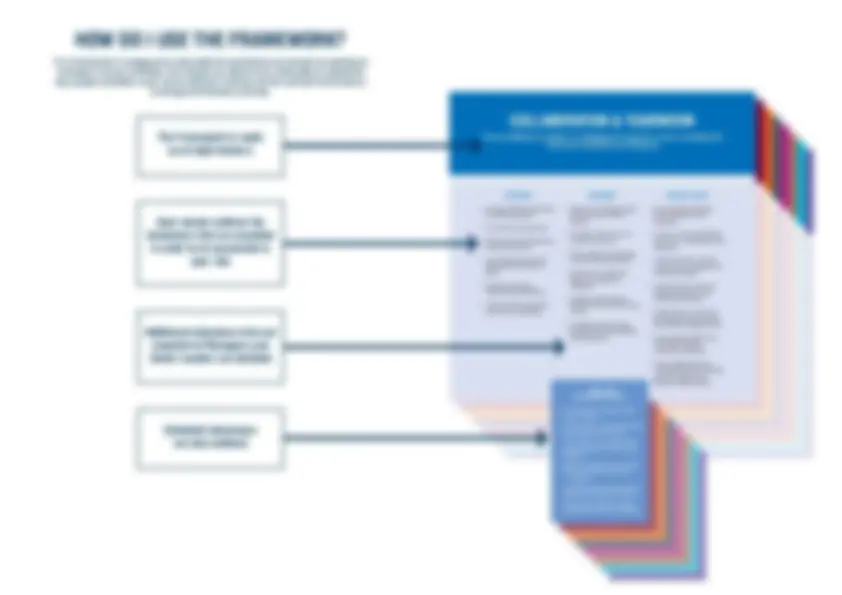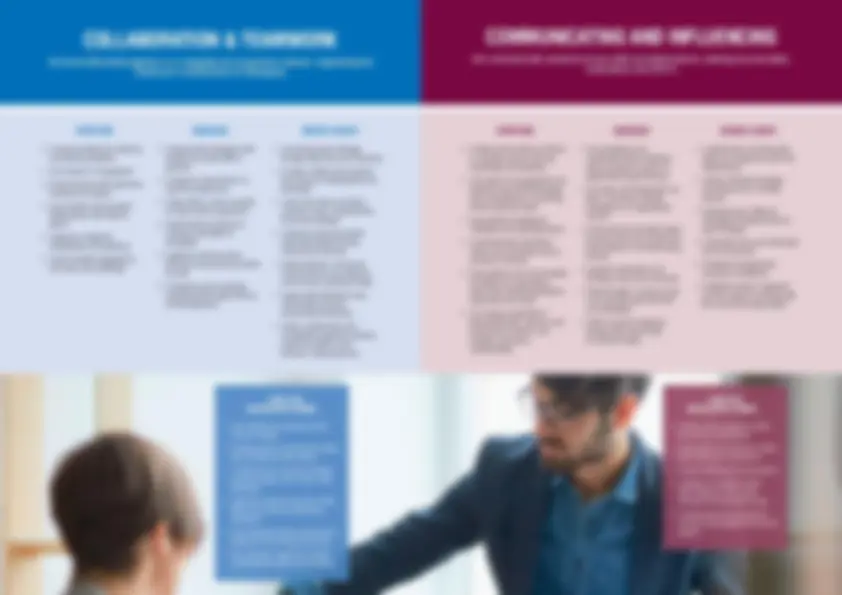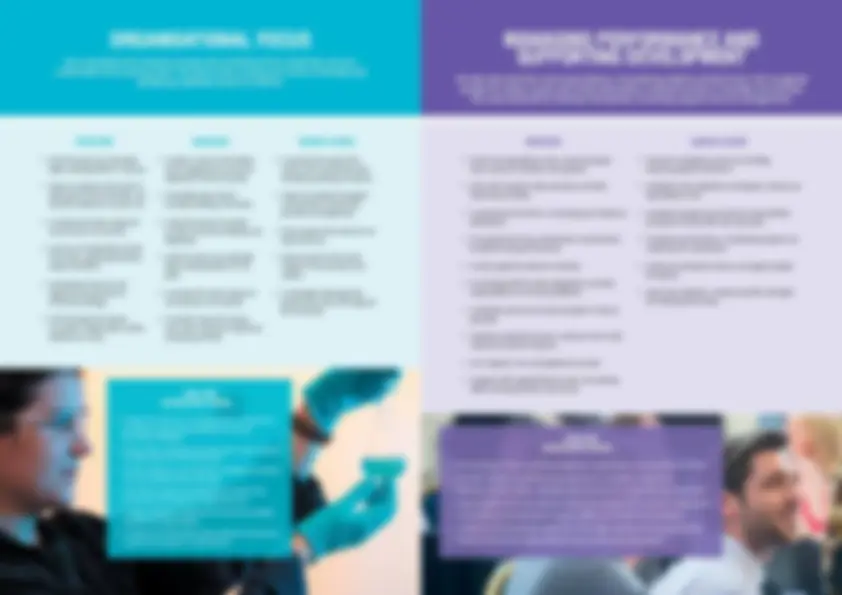Download Comparison of Leadership Styles & Effectiveness: Everyone, Manager, & Senior Leader Roles and more Study notes Decision Making in PDF only on Docsity!
GLASGOW
PROFESSIONAL
BEHAVIOURAL
FRAMEWORK
1
CONTENTS
- Introduction
- What does the Framework comprise of?
- How do I use the Framework?
- The eight behaviour clusters;
COLLABORATION AND TEAMWORK
COMMUNICATING AND INFLUENCING
CUSTOMER FOCUS
ENGAGING WITH CHANGE
RESULTS AND SOLUTION FOCUSSED
PLANNING AND ORGANISATION
ORGANISATIONAL FOCUS
MANAGING PERFORMANCE AND SUPPORTING DEVELOPMENT
HOW DO I USE THE FRAMEWORK?
The Framework is designed to articulate the behaviours we should be striving to
embody in all our activities, and should be referenced continually in relation to
key people activities, such as recruitment, training and the annual Performance
Development Review process.
COLLABORATION & TEAMWORK We work effectively together in a collegiate and supportive manner, respecting the needs and contributions of colleagues.
EVERYONE
- I resolve problems by listening and offering solutions
- I am honest in my approach
- I treat everyone with openness, honesty and respect
- I use creative ways to build relationships and relate to others
- I approach situations consistently and positively
- I make valuable suggestions and share my knowledge
MANAGER
- I always treat colleagues with respect and value other’s opinions
- I recognise where there is a need to compromise
- I value other’s views and take on-board differing opinions
- I build trust by drawing on individual strengths of colleagues
- I publicise what has been achieved and give praise where it is due
- I recognise and encourage improvement through training and development
SENIOR LEADER
- I encourage open dialogue through openness and inclusivity
- I create a culture which places high value on collaboration and teamwork
- I work with others to build a common vision, aligned to the University strategy
- I actively create successful alignment between teams across the University
- I build cohesive, formal and informal teams and networks which deliver significant value
- I appreciate that others may view people and their environment differently
- I take a collaborative and consultative approach seeking input from others in the decision-making process
The Framework is made up of eight clusters
Each cluster outlines the behaviours that are essential in order to be successful in your role
Additional behaviours that are expected of Managers and Senior Leaders are detailed
Unhelpful behaviours are also outlined
I AM LESS SUCCESSFUL WHEN…
- I am reluctant to speak up when I know I should
- I always prefer to work alone rather than collaborate with others
- I focus only on my own priorities and do not take a fair share of the workload
- I take the credit for the work of the team and I criticise other team members
- I am reluctant to take ownership of problems when things go wrong
- I do not trust, respect or engage constructively with my colleagues
COMMUNICATING AND INFLUENCING
We communicate clearly for all our staff and stakeholders, making sure we listen,
understand and inform.
EVERYONE
- I influence the actions of others in a positive way by sharing knowledge and expertise
- I am aware of my approach and adapt it to suit different people and circumstances, according to their preferred style
- I use positive language to motivate and encourage others
- I communicate information clearly and accurately using a variety of channels
- I use evidence and real examples to influence and persuade, rather than expecting people to understand my views
- I am always respectful of the backgrounds, opinions and differences of others, and maintain necessary confidentiality
MANAGER
- I run productive and constructive team meetings where everyone is given an opportunity to get involved
- I am open and honest with my team, and deliver difficult messages in an appropriate manner
- I know when to escalate issues to senior staff and consider the best method of communicating to them
- I provide instructions and briefings clearly and concisely
- I think through in advance how I will communicate with staff and colleagues
- I talk to my team regularly, keeping them up-to-date on relevant issues
SENIOR LEADER
- I make time to communicate, listen and respond to staff and stakeholders
- I deliver difficult messages sensitively and in a timely manner
- I persuade and influence colleagues through trust and open dialogue
- I articulate risks and challenges for the University
- I feedback management decisions confidently
- I establish what is important and find ways to communicate this across the organisation
I AM LESS
SUCCESSFUL WHEN…
- I focus on the negatives rather than being constructive
- I keep quiet if I am unclear, rather than asking for clarification
- I avoid challenging conversations
- I gossip or complain about other people or their work, without confronting the issue
- I quickly jump to conclusions and don’t give people the time to explain
COLLABORATION & TEAMWORK
We work effectively together in a collegiate and supportive manner, respecting the
needs and contributions of colleagues.
EVERYONE
- I resolve problems by listening and offering solutions
- I am honest in my approach
- I treat everyone with openness, honesty and respect
- I use creative ways to build relationships and relate to others
- I approach situations consistently and positively
- I make valuable suggestions and share my knowledge
MANAGER
- I always treat colleagues with respect and value other’s opinions
- I recognise where there is a need to compromise
- I value other’s views and take on-board differing opinions
- I build trust by drawing on individual strengths of colleagues
- I publicise what has been achieved and give praise where it is due
- I recognise and encourage improvement through training and development
SENIOR LEADER
- I encourage open dialogue through openness and inclusivity
- I create a culture which places high value on collaboration and teamwork
- I work with others to build a common vision, aligned to the University strategy
- I actively create successful alignment between teams across the University
- I build cohesive, formal and informal teams and networks which deliver significant value
- I appreciate that others may view people and their environment differently
- I take a collaborative and consultative approach seeking input from others in the decision-making process
I AM LESS
SUCCESSFUL WHEN…
- I am reluctant to speak up when I know I should
- I always prefer to work alone rather than collaborate with others
- I focus only on my own priorities and do not take a fair share of the workload
- I take the credit for the work of the team and I criticise other team members
- I am reluctant to take ownership of problems when things go wrong
- I do not trust, respect or engage constructively with my colleagues
RESULTS AND SOLUTIONS FOCUSED
We strive to deliver, and exceed, the results required, setting and achieving realistic
goals. We prioritise tasks, overcome obstacles and accept accountability whilst
remaining resilient and effective.
EVERYONE
- I respond positively to challenges and overcome obstacles
- I am resolute, results focused and tenacious
- I remain calm, patient and decisive under pressure and deliver results
- I focus on the end goal
- I offer practical solutions to problems
- I take responsibility for mistakes
- I use initiative and take pride in my work
MANAGER
- I take ownership for tasks whilst trusting others to deliver their own responsibilities
- I act to resolve issues before escalation
- I am calm and proportionate in response to difficult circumstances
- I provide solutions and offer alternative options
- I draw upon past experience to resolve issues
- I respond positively to criticism and/or feedback
SENIOR LEADER
- I take ownership of problems
- I work with others to actively seek solutions and resolve issues
- I focus on what has to be achieved and I know what success looks like
- I am open to constructive criticism and willing to admit mistakes
- I am diligent and manage situations and problems through to conclusion
- I remain resilient in the face of competing demands
- I maintain determination in frustrating circumstances
PLANNING AND ORGANISING
We take time to plan, organise and prioritise our work, while remaining agile in
responding to the needs of the organisation. We do not shy away from making
decisions and/or learning from one other.
EVERYONE
- I approach my work in an organised way to make sure my plans are delivered effectively and on time
- I take responsibility for reprioritising and negotiating my workload when faced with competing demands
- I critically assess risks before making final decisions
- I pay meticulous attention to detail
- I anticipate problems and issues and resolve promptly
- I identify different options for solving problems
MANAGER
- I assess the most effective way of delivering positive outcomes
- I work collaboratively with colleagues and stakeholders when planning and making decisions
- I consult and make sure my team has the right resources and support
- I set clear expectations and time frames for my team so they are aware of their roles and responsibilities
- I take into account individual strengths and areas of improvement to set achievable objectives
- I prepare and plan my work priorities, clarifying the scope of tasks to be achieved
SENIOR LEADER
- I think ahead and take time to review the strategic landscape
- I explore complex issues through multiple perspectives
- I recognise challenges and focus on turning strategy into achievable operational plans
- I provide direction to progress the University’s strategic priorities
- I assess the situation and balance risk with benefits to make sensible but courageous decisions where needed
I AM LESS
SUCCESSFUL WHEN…
- I shy away from addressing problems and assume someone else will resolve the issue
- I focus on only one part of the problem and fail to see the bigger issue
- I tend to blame others when things go wrong
- I put things off unless they are urgent
- I find it difficult to challenge and voice my opinions or suggestions for change
- I often find it difficult to translate ideas into reality
I AM LESS
SUCCESSFUL WHEN…
- I put personal interest before the best decision
- I do not take evidence and data into account when planning
- I react to situations rather than approach my work proactively
- I constantly seek validation of my decisions as I am risk averse
- I miss deadlines because I have not taken time to plan my work priorities
- I accept information at face value and do not pay attention to detail
- I assume my team understand their role, responsibilities and expectations
ORGANISATIONAL FOCUS
We understand the overall purpose and priorities of the University, and our
contribution to achieving them. We take pride in being part of the University and
speaking positively about it to others.
EVERYONE
- I think forward and anticipate future developments in my area
- I take an interest in the work of other parts of the University, and how this relates to my own role
- I consider the wider impact of my decisions and actions
- I act as an Ambassador for the University, speaking positively about it to others
- I understand how my role supports achievement of University strategy
- I think through the impact my actions might have on other functions or areas
MANAGER
- I create a vision for the future which supports the aims and objectives of the University
- I formulate plans which translate strategy into action
- I align the work of my team to wider University strategy and objectives
- I think forward and anticipate future developments for my team
- I consider the wider impact of my decisions and actions
- I consider long-term issues, even when having to respond to changing priorities
SENIOR LEADER
- I consider the longer-term needs of the University when developing strategy and plans
- I align my activity to support achievement of University priorities and objectives
- I think beyond the needs of my specialist area
- I take account of the wider impact of my decisions and actions
- I investigate developments beyond our sector that apply to the University
MANAGING PERFORMANCE AND
SUPPORTING DEVELOPMENT
We set clear direction and expectations, empowering staff to achieve them. We recognise
people for doing a good job whilst addressing underperformance honestly and directly.
We help everyone to develop themselves, providing support and encouragement.
SENIOR LEADER
- I set out a compelling vision and strategy, inspiring people to achieve it
- I establish clear objectives and targets, making my expectations clear
- I empower people by giving them responsibility and space to make their own decisions
- I recognise performance, encouraging people and nurturing their enthusiasm
- I address underperformance and support people to improve
- I give clear feedback, recognising both strengths and development needs
MANAGER
- I make my expectations clear, ensuring people have a sense of direction and purpose
- I give staff scope to make decisions and take ownership for tasks
- I recognise performance, encouraging and building enthusiasm
- I am prepared to have constructive conversations to address underperformance
- I coach people to help them develop
- I encourage staff to make suggestions and take responsibility for resolving problems
- I celebrate success and praise people for doing a good job
- I address underperformance, making it clear what needs to be done to improve
- I am impartial, fair and equitable to all staff
- I support staff opportunities to learn and develop within and beyond their current role
I AM LESS
SUCCESSFUL WHEN…
- I focus my effort on my department or function’s priorities, paying little attention to overall University strategy
- I take action without considering the wider impact on other parts of the University
- I block progress on University initiatives to protect my own departmental interests
- I do little to explore developments outside the University that might be of benefi t to us
- I speak negatively about the University to people outside the organisation
- I respond to immediate needs without considering longer-term issues or implications
I AM LESS
SUCCESSFUL WHEN…
- I am not always clear in defining objectives, expectations and direction to others
- I tell staff what to do without explaining why it is needed or important
- I maintain overall control, delegating few decisions or responsibilities to my staff
- I expect people to do well without needing encouragement or praise for good work
- I avoid dealing with underperformance, putting off difficult conversations
- I criticise and blame people when they have made mistakes or things go wrong
- I focus on delivering results without making time to develop people


















